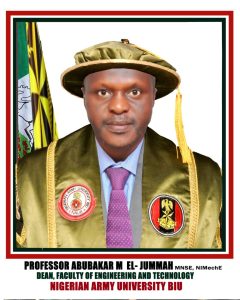The Dean FET
Abubakar M. El-jummah MNSE, MNIMechE
Professor of Heat Transfer and Fluid Mechanics in Energy Engineering
[email protected]; [email protected]
GSM No.: 08055260613, 08037803678
The Dean, Faculty of Engineering and Technology (FET), Nigerian Army University Biu (NAUB) is a Professor from the Department of Mechanical Engineering. A Seasoned University Administrator: previously a Director, Head of Department, Sub-Dean (Deputy Dean) and other Departmental and Faculty Functions. The Dean’s hard works also extends to both Internal (University) and External (international, national and domestic) Community Services that earned him high level of Academic, Professional and Leadership recognitions home and abroad.
He obtained his Bachelor of Engineering (B. Eng.), Master of Engineering (M. Eng.) and Doctor of Philosophy (Ph. D) Degrees from University of Maiduguri, Bayero University, Kano and University of Leeds, respectively. His Membership of Professional bodies include: Nigerian Society of Engineers (NSE), Nigeria Institution of Mechanical Engineers (NIMechE) and American Society of Mechanical Engineers (ASME). He is also Registered Engineer with the Council for the Regulation of Engineering in Nigeria (COREN)
Professor El-jummah is a Researcher per excellence with research interest in the areas of Gas Turbine Internal Wall Cooling and Emissions, Heat Transfer and Fluid Mechanics, Renewable Energy Systems alongside Material Development. His work focuses on using Computational Fluid Dynamics (CFD) Tool to carry out researches in Numerically based Applications, which also earns him a lot of publications to his credit.
The Professor is an expert on the Computational Study of Convective Heat Transfer using Computational Fluid Dynamics: The Numerical Analysis that Concentrate in Predicting Complex Convective Heat Transfer and Aerodynamics Situations using Impingement and Impingement/Effusion Air Jet Cooling Applied to Gas Turbine Combustor and Turbine Blade Wall Cooling. Attached is his detailed curriculum vitae (CV).
Faculty Student Hand Book
DEPARTMENT OF ELECTRICAL AND ELECTRONIC UNDERGRADUATE STUDENT HANDBOOK 2022
DEPARTMENTS AND THEIR HEADS
Department of Electrical and Electronic Engineering: is headed by Engr. Nuraini Sunusi Ma’aji is an Electrical Engineer who did his undergraduate studies at Kano University of Science and Technology Wudil, his MSc in Energy System Engineering at Cyprus International University, Cyprus. He started his professional career in 2013 at the National Youth Service Corps where he served with the Federal Capital Development Authority, Abuja Nigeria. In the year 2015, he joined … Read More
Department of Civil Engineering: is headed by Engr. Abdullahi G. Musa, the current acting Head of Department was born on 8th October, 1984 in Bauchi town of Bauchi State. He attended Kofar Wase Primary School Bauchi, from 1990-1996, Government College Toro from 1996-2002, Abubakar Tafawa Balewa University, Bauchi, from 2004-2010 and 2013-2017 where he obtained B. Eng Civil Engineering and M. Eng Structural Engineering respectively… Read More
Department of Mechanical Engineering: Is headed by Dr Chindapi Nathan Civil engineers plan, design and supervise construction of many essential facilities and structures such as bridges, dams, roads, buildings, ports, etc. Included in the study of civil engineering are courses in water resources and environmental engineering that are directly related to the solution of hazardous waste and pollution problems Read More
